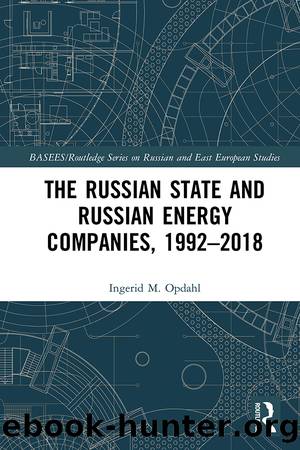The Russian State and Russian Energy Companies, 1992â2018 by Ingerid M. Opdahl

Author:Ingerid M. Opdahl [Opdahl, Ingerid M.]
Language: eng
Format: epub
ISBN: 9780815354055
Barnesnoble:
Publisher: Taylor & Francis
Published: 2020-06-30T00:00:00+00:00
The new stability: Loyalty and limits for private companies
The state now increased its capacity in the oil sector, but the government was impatient with oil companiesâ efforts to minimise tax payments. In 2003, Putin and the government clashed with Mikhail Khodorkovskii of Yukos on the subject of oil sector regulation. The case included tax optimisation, especially through domestic offshore havens, but also the extent to which the state should influence production methods. Yukosâs attempts to develop export options with China but without Transneft, and its lobbying of the Duma, especially with regard to taxation, were other issues of contention (Gustafson, 2012, pp.294â295). When Khodorkovskii was arrested on tax claims in October, the campaign against Yukos, underway for some time, moved up a gear into expropriation. The heads of other companies kept quiet at this point. In Thane Gustafsonâs analysis, Alekperovâs previous alignment with some of Khodorkovskiiâs views on industry development disappeared at the first public hint of a confrontation with Putin (Gustafson, 2012, pp.335â336). As discussed here, Alekperov had long seen it as imperative to maintain good working relations with the state. Because of that, he quickly grasped the implications and potential damage to other companies of the Yukos affair. A few weeks ahead of Khodorkovskyâs arrest, Alekperov emphasised that any challenge to the current order would have to come from somewhere else (Butrin, 2003).
In the period from October 2003 to the end of 2005, Yukosâs production company, Yuganskneftegaz, was sold off and eventually acquired by Rosneft. In the same period, the major private oil company Sibneft came under Gazpromâs control. The state undertook an extensive control mission of oil industry operations in West Siberia (Gustafson, 2012, pp.308â309). The private oil sector seemed under threat of renationalisation. Rosneft and Gazprom acquired several large oil companies in the years that followed. As a result, the playing field was tilted in favour of the state (Bradshaw, 2009, p.5).
Lukoil complied with the new formal and informal requirements, and remained a successful company. Even more than before, Alekperov was prone to describing Lukoil as âstate-mindedâ. There was no difference, in principle, he insisted, between the Russian oil companies. They were all Russian (e.g. in Tutushkin, 2008). The subject often came up in the context of licensing on the continental shelf, suspended in 2005, and access to new offshore fields. This was of particular interest to Lukoil, because it was the next frontier of its development and important to its strategy.
The Yukos case illustrated the importance of political loyalty and adherence to informal convention to avoid being targeted for selective rule enforcement. In exemplifying the selective application of formal rules, the Yukos affair reinforced a system of personal privileges. Alekperov learnt this lesson. Perhaps most importantly, once he understood that Putin was promoting state-owned Rosneft, still a company of lesser significance than his own, he settled all ongoing disputes with that company (Gustafson, 2012, pp.334â335). Lukoil quickly eliminated its legal tax optimisation schemes like those employed by Yukos (Skorobogatâko, 2004). In December 2004, when the Kremlin asked the oil companies to cut petrol prices, Lukoil was the first to be asked.
Download
This site does not store any files on its server. We only index and link to content provided by other sites. Please contact the content providers to delete copyright contents if any and email us, we'll remove relevant links or contents immediately.
Whiskies Galore by Ian Buxton(41984)
Introduction to Aircraft Design (Cambridge Aerospace Series) by John P. Fielding(33115)
Small Unmanned Fixed-wing Aircraft Design by Andrew J. Keane Andras Sobester James P. Scanlan & András Sóbester & James P. Scanlan(32788)
Aircraft Design of WWII: A Sketchbook by Lockheed Aircraft Corporation(32277)
Craft Beer for the Homebrewer by Michael Agnew(18230)
Turbulence by E. J. Noyes(8040)
The Complete Stick Figure Physics Tutorials by Allen Sarah(7361)
The Institute by Stephen King(7022)
Kaplan MCAT General Chemistry Review by Kaplan(6924)
The Thirst by Nesbo Jo(6921)
Bad Blood by John Carreyrou(6610)
Modelling of Convective Heat and Mass Transfer in Rotating Flows by Igor V. Shevchuk(6431)
Learning SQL by Alan Beaulieu(6276)
Weapons of Math Destruction by Cathy O'Neil(6261)
Man-made Catastrophes and Risk Information Concealment by Dmitry Chernov & Didier Sornette(6001)
Permanent Record by Edward Snowden(5828)
Digital Minimalism by Cal Newport;(5747)
Life 3.0: Being Human in the Age of Artificial Intelligence by Tegmark Max(5541)
iGen by Jean M. Twenge(5407)
